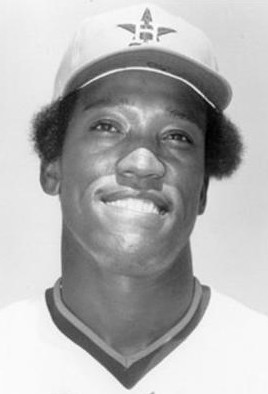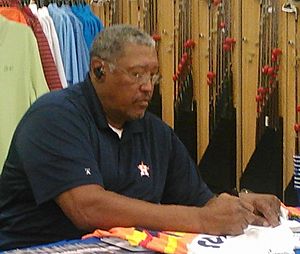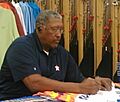J. R. Richard facts for kids
Quick facts for kids J. R. Richard |
|||
|---|---|---|---|

Richard with the Houston Astros in 1976
|
|||
| Pitcher | |||
| Born: March 7, 1950 Vienna, Louisiana |
|||
| Died: August 4, 2021 (aged 71) Houston, Texas |
|||
|
|||
| debut | |||
| September 5, 1971, for the Houston Astros | |||
| Last appearance | |||
| July 14, 1980, for the Houston Astros | |||
| MLB statistics | |||
| Win–loss record | 107–71 | ||
| Earned run average | 3.15 | ||
| Strikeouts | 1,493 | ||
| Teams | |||
|
|||
| Career highlights and awards | |||
|
|||
James Rodney Richard (born March 7, 1950 – died August 4, 2021) was an American Major League Baseball starting pitcher. He played for the Houston Astros from 1971 to 1980.
After finishing high school, Richard was chosen by the Astros as the second overall pick in the 1969 baseball draft. He made his major league debut with the Astros in 1971. Until 1975, Richard played a smaller role as a pitcher. In 1975, he became a full-time starting pitcher.
From 1976 to 1980, J. R. Richard was one of the best pitchers in baseball. He led the National League twice in strikeouts and once in earned run average (ERA). He also led the league three times in how few hits he allowed per nine innings. He won at least 18 games every year between 1976 and 1979. On July 30, 1980, Richard suffered a stroke caused by a blood clot in his neck. This sudden event ended his amazing baseball career at age 30. His 313 strikeouts in 1979 were an Astros team record for many years. Two-time National League MVP players, Johnny Bench and Dale Murphy, said Richard was the toughest pitcher they ever faced.
In 1981, Richard tried to return to baseball with the Astros. However, the stroke had made his reaction time slower and affected his depth perception. He played in the minor leagues for a few more seasons. The Astros released him in 1984. After his baseball career, Richard faced tough times. He lost money in bad business deals and went through personal challenges. In 1994, he found himself without a home. Richard later found help at a local church and became a Christian minister.
Contents
Early Life and High School Star
Richard was born in Vienna, Louisiana. He became a star in both baseball and basketball at Lincoln High School in nearby Ruston, Louisiana. By his senior year, Richard was very tall, standing at 6 feet 8 inches. He weighed 220 pounds. That year, he was a starting pitcher for his high school team and didn't allow any runs all season. In one game, Richard hit four home runs in a row. He also pitched his team to a huge 48–0 victory. Richard's baseball hero was St. Louis Cardinals pitcher Bob Gibson. Richard never lost a game he started during his high school career.
After high school, he turned down over 200 basketball scholarship offers. Instead, he chose to sign with the Houston Astros. The Astros picked him second overall in the 1969 amateur baseball draft. Richard later shared that other talented players from his high school didn't work as hard. He said their choices led their lives in different directions.
Starting His Professional Journey
After the Astros drafted Richard, they sent him to play for the Covington Astros. This was a beginner-level minor league baseball team. Richard started 12 games there, winning five and losing four. He struck out many batters, but he sometimes struggled with his pitching control. In 56 innings, Richard struck out 71 batters. However, he also walked 52 batters.
The next year, at age 20, Richard moved up to the Cocoa Astros. He continued to allow very few hits. Despite a 4–11 win-loss record, he had a good 2.39 ERA. He even pitched a no-hitter game. During this time, Richard could throw a very fast fastball, sometimes over 100 miles per hour. His slider was also very fast. The Astros then promoted Richard to Class-AAA baseball. This is just one step below the major leagues. He wore number 50, which he kept for his whole career. Richard led the league with 202 strikeouts in 173 innings. He finished with 12 wins and seven losses. After this, the Houston Astros called him up to the big leagues.
First Taste of the Major Leagues
Richard joined the Astros in 1971 as a "September call-up." This means he was brought up late in the season. On September 5, he made his major league debut at just 21 years old. He played against the San Francisco Giants. Richard used his fastball and slider to win the game. He also tied a 17-year-old record by striking out 15 batters in his first major league start. He struck out famous players like Willie Mays three times.
Richard struggled in his next few starts. He walked many batters and threw wild pitches. He was replaced early in his final game of the season. For the next few years, Richard moved between the minor leagues and the major leagues. He didn't become a regular starter for the Astros until 1975. He worked on his pitching control in the minor leagues. Even though his stats showed he moved back and forth due to wildness, Richard sometimes told reporters that racism also made it harder for him to become a regular player sooner.
Becoming an Astros Star
In 1975, Richard became a main pitcher for the Astros. This happened after the team traded a pitcher and lost another. Richard started the season as the third pitcher in the Astros' rotation. He still had some control issues, walking many batters in some games. However, he also pitched complete games and shutouts. He finished the year with 12 wins and 10 losses. He was the only starting pitcher on the team with a winning record. He led the team with 176 strikeouts. He also led the league in walks allowed and wild pitches.
A Breakout Year: 1976
Richard became the Astros' top pitcher in 1976. He was the Opening Day starter. After a tough first game, he won five of his next six decisions. He even pitched a 10-inning shutout. By the All-Star break, he had a 9–9 record with a good 2.88 ERA. From July to August, Richard had eight complete games, including one shutout. He improved his record to 16–13. He also hit his first home run of the season.
Richard ended the season with 20 wins and 15 losses. He had 14 complete games and three shutouts. He also had 214 strikeouts. At age 26, Richard became only the second Astros pitcher to win 20 games in a season. He was named the Most Valuable Player of the Astros by baseball writers. He finished seventh in the voting for the Cy Young Award, which goes to the best pitcher. He led the league in allowing the fewest hits per nine innings. He also led all National League pitchers with 14 hits as a batter.
Continued Success
1977 Season
Richard started the 1977 season strongly. He pitched seven complete game victories in the first half. By the All-Star break, he had nine wins and six losses. He also had 119 strikeouts and a 2.69 ERA. He pitched three complete games, including two shutouts, from late August to mid-September. He had 11 and 10 strikeouts in his final two starts of that period.
Richard finished the season with 18 wins and 12 losses. He pitched 267 innings and had 214 strikeouts. His ERA was 2.97. He led the Astros' pitching staff in wins, starts, complete games, and strikeouts. He also improved his fielding and didn't make any errors that season. Richard was also a good hitter for a pitcher. He had two triples and two home runs. After the season, he had an emergency appendectomy. He spent the off-season working out and fishing.
Record-Setting Year: 1978
Richard was the Astros' Opening Day starter again in 1978. After a tough first game, he pitched a complete game two-hit shutout in his next start. From late April to early June, Richard threw six complete games, including two shutouts in a row. He lowered his ERA and struck out 67 batters. By the All-Star break, he had 157 strikeouts in 139 innings.
After the break, Richard continued to pitch well. He was named the National League Pitcher of the Month for July. He had a perfect 4–0 record with a 1.29 ERA and 58 strikeouts. On August 21, he broke Don Wilson's club record for strikeouts. In his third-to-last start, Richard broke Tom Seaver's National League record for strikeouts by a right-handed pitcher. In his final game, Richard reached 300 strikeouts for the season. He also hit his seventh career home run, becoming the Astros' all-time leader in home runs by a pitcher. He was only the tenth pitcher in history to strike out over 300 batters in a single season.
Richard finished the season with 18 wins, 11 losses, and a 3.11 ERA. He led the team in many pitching categories. He held opposing batters to a very low batting average. He finished fourth in the Cy Young Award voting. He also led the league in strikeouts per nine innings and fewest hits allowed per nine innings.
1979 Season
In his second game of the 1979 season, Richard set a modern record. He threw six wild pitches in one game. Despite this, he struck out 13 batters and won the game. He won his first four games that season. He continued to get many strikeouts and started to walk fewer batters. By the All-Star break, Richard had 158 strikeouts.
He pitched nine complete games in a row from late July to early September. This set an Astros club record. On September 21, he struck out 15 batters, matching his career high. He closed out the season by winning his 11th straight game against the Dodgers. He was named the National League Pitcher of the Month for September.
He finished the season with 18 wins and 13 losses. He had a league-best 2.71 ERA. He struck out 10 or more batters 14 times. He led the league with 313 strikeouts for the season, breaking his own club record. Richard joined Nolan Ryan and Sandy Koufax as the only modern pitchers to strike out over 300 batters in two seasons in a row. He finished third in the Cy Young Award voting. In October, Richard signed a four-year contract with the Astros.
1980 Season and Stroke
By 1980, J. R. Richard was one of the best pitchers in baseball. Many players said he was the toughest pitcher to hit against. He was now teamed with Nolan Ryan, another famous strikeout pitcher. Richard started the year with five straight wins and a very low ERA. He was named National League Pitcher of the Month for April. He even threw three complete-game shutouts in a row. On July 3, he broke the Astros' team record for career strikeouts. This was Richard's last major league victory.
Richard was chosen to be the National League's starting pitcher in the Major League Baseball All-Star Game on July 8. However, he only pitched two innings because of back and shoulder problems. As the season went on, Richard started to complain that his arm felt "dead." He felt discomfort in his shoulder and forearm. His concerns were not fully understood by everyone. Some people thought he was just complaining or couldn't handle the pressure.
During his next start on July 14, Richard had trouble seeing his catcher's signals. He also had difficulty moving his arm. He left the game in the fourth inning after feeling his right arm go "dead." He had numbness in his fingers and couldn't hold a baseball. The Astros placed Richard on the disabled list. This turned out to be his last major league game.
Doctors found a blockage in the arteries of his right arm. On July 30, Richard was warming up before a game when he suffered a major stroke and collapsed. He had a headache and felt weak. Then he had vision problems and couldn't move the left side of his body. He needed emergency surgery that night. Doctors later found that Richard had experienced three separate strokes. This was due to blockages in his arteries. They also found that his clavicle and first rib were pinching an artery in his arm when he pitched. This caused his arm to ache and feel "heavy." Richard went through rehabilitation and missed the rest of the season.
Trying to Come Back
In 1981, Richard began a program to recover from the stroke. He trained with the Astros and a university team. He was put on the Astros' active roster in September 1981. However, the manager felt he wasn't ready to play.
The next year, Richard pitched in minor league games to try and get back into shape. He struggled with his control. He was promoted to Triple-A baseball but still had difficulty. He joined the Astros' extended roster but didn't play in any games.
In 1983, Richard had more health problems. He needed surgery on his left leg. The Astros released him in 1983 but re-signed him in 1984. Just a few months later, he was released again. This ended his baseball career. Even though he recovered almost completely, the risk of future problems was too high. His final major league record was 107 wins and 71 losses. He had 1,493 strikeouts and a 3.15 ERA. Nolan Ryan broke his Astros record for career strikeouts in 1987.
Life After Baseball
After his baseball career, Richard faced many challenges. He lost money in a bad business deal. He also went through personal difficulties that led to him losing his home in Houston by 1994. He found himself without a place to live.
In 1995, Richard became eligible for his pension from Major League Baseball. He played in an "Old-Timers' Day" game with the Astros that year. After spending many nights without a home, he found help at the Now Testament Church. He worked with the minister, Reverend Floyd Lewis. Richard overcame his homelessness. He believed that "God was always on his side." Richard started working at an asphalt company. Later, he returned to the church as a minister.
Richard became very involved in the Houston community. He worked with people who donated money to help start baseball programs for children. In 2005, a small movie called Resurrection: The J. R. Richard Story was made. It showed his baseball career and his life after baseball. In 2018, Richard was honored by the Negro Leagues Baseball Museum. He was recognized as a member of the "Hall of Game." In 2019, Richard was inducted into the Baseball Reliquary's Shrine of the Eternals.
Death
J. R. Richard passed away in a Houston hospital on August 4, 2021. His family said he had complications from COVID-19. He was 71 years old.
Images for kids
 | Anna J. Cooper |
 | Mary McLeod Bethune |
 | Lillie Mae Bradford |




